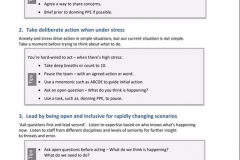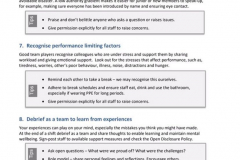Introduction
Working in intensive care can present some stressful and challenging situations that often require an immediate clinical response in a high fidelity setting. Being aware of human factors and good non technical skills can help improve performance in these situations.
This section is merely designed as an overview and to provide a brief introduction to these concepts. Hopefully it may stimulate some thought into how they may be incorporated into your critical care practice.
A human factors approach accepts that humans are fallible, have biases, a limited working memory capacity and that they will make mistakes. Accepting this and being aware of these factors allows for systems to be designed that can help mitigate these risks, and allow for robust processes to review any adverse events in order to try and reduce the likelihood of them happening again.
Non Technical Skills
Non technical skills are the cognitive, personal and social skills that complement technical (clinical) skills and help ensure safe patient and staff care by minimising the risk of error. They include:
- Situational Awareness
- Decision making
- Communication
- Team working
- Leadership
- Coping with stress and fatigue
Examples of good non technical skills in ICU include:
- Identification of clear roles (including a team leader) during a team briefing.
- The use of clear, non ambiguous language.
- Avoidance of any unnecessary distractions.
- Clearly stating the problems identified, so the entire team are aware of what the issues are and what management plans there are. This provides a natural opportunity for others to vocalise their thoughts or concerns.
- Closed loop communication
- e.g. 1mg of adrenaline needs to be given
- The team leader addresses one person (ideally by name) and clearly asks for 1mg of adrenaline to be given
- The person asked to carry out the task repeats the instruction and on completion states that they have “given 1mg adrenaline”
- The team leader should maintain a situational overview (often best appreciated from the end of the bed) and not become task focused.
- If the team leader needs to complete a task then the “team leader” role should be delegated to someone else whilst the task is done.
- Any member of the team should feel that they can raise any concerns
- The CUSS systems allows graded assertiveness
- I’m concerned what you are doing may…
- I don’t understand….
- I’m seriously worried…
- Please stop….
- The CUSS systems allows graded assertiveness
- Ensuring regular breaks and debriefing for all team members.
The Clinical Human Factors Group have created some key messages (see below) to that are especially important during the COVID-19 outbreak given the number of acutely unwell patients and staff that may be unfamiliar with critical care.
References and Further Reading
Intensive Care Network: Human Factors
Anaesthetists’ Non Technical Skills (ANTS) Handbook
Author: George Walker


